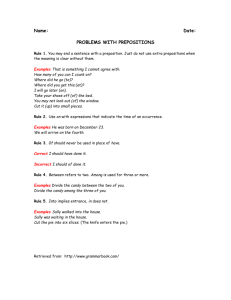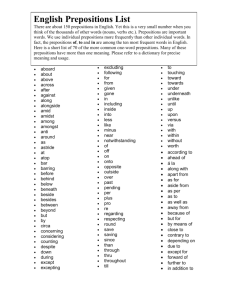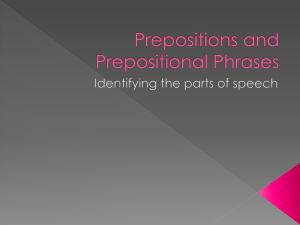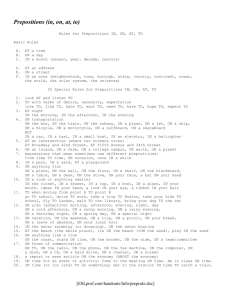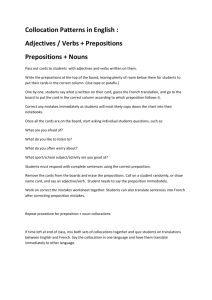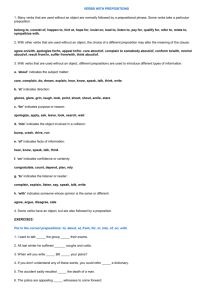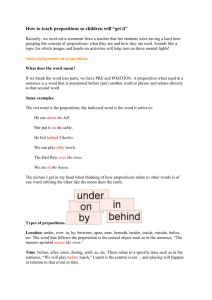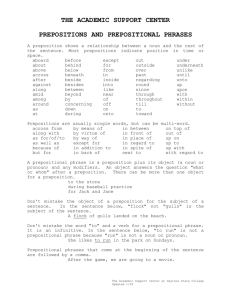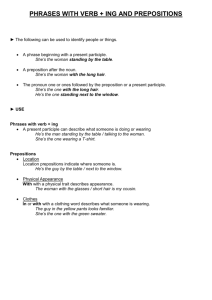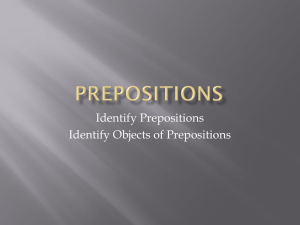HUNTER COLLEGE READING/WRITING CENTER GRAMMAR AND
advertisement
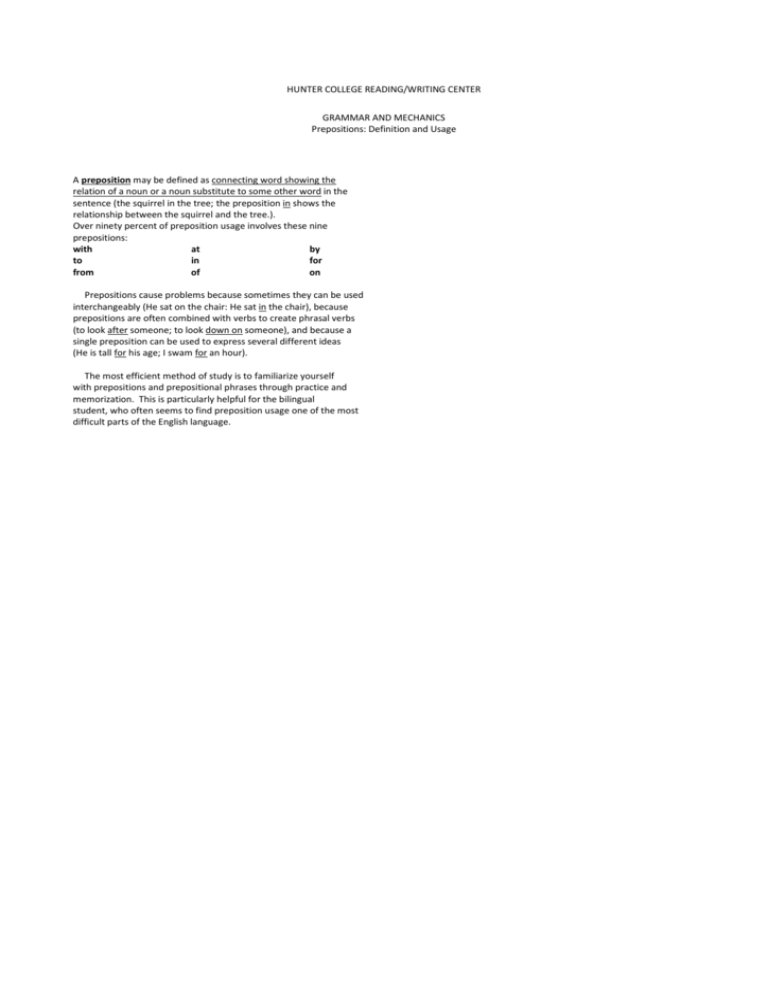
HUNTER COLLEGE READING/WRITING CENTER GRAMMAR AND MECHANICS Prepositions: Definition and Usage A preposition may be defined as connecting word showing the relation of a noun or a noun substitute to some other word in the sentence (the squirrel in the tree; the preposition in shows the relationship between the squirrel and the tree.). Over ninety percent of preposition usage involves these nine prepositions: with at by to in for from of on Prepositions cause problems because sometimes they can be used interchangeably (He sat on the chair: He sat in the chair), because prepositions are often combined with verbs to create phrasal verbs (to look after someone; to look down on someone), and because a single preposition can be used to express several different ideas (He is tall for his age; I swam for an hour). The most efficient method of study is to familiarize yourself with prepositions and prepositional phrases through practice and memorization. This is particularly helpful for the bilingual student, who often seems to find preposition usage one of the most difficult parts of the English language. Uses of Common Prepositions Prepositions are used to express a number of relationships, including time, location, manner, means, quantity, purpose, and state or condition. The following outline demonstrates the uses of common prepositions. A. TIME about: at: by: from: of: on: past: about noon (approximately) at five o'clock at last (finally) by midnight (no later than) from Monday to Friday a quarter of three (15 minutes before) on Tuesday (day of the week) on May 8 (date) on time (punctual) a quarter past three (15 minutes after) after: for: in: to: after the game after lunch after three for an hour (duration) in the morning in the fall in April in 1987 in six months (at the end of) in time (early enough) a quarter to three (15 minutes before) B. PLACE OR DIRECTION around: down: from: of: on: through: up: with: She walked around the car. They lived down the hall. We immigrated from Peru in 1991. The restaurant is one mile from here. We moved south of Montreal We sat on the ocean pier. They drove through the tunnel. He walked up the stairs. He went with me. at: in: inside: to: They are at home. We were at the restaurant. He smiled at her. He lives in a trailer. We waited in the bus. Put it inside the house. He went to Prague. Give it to me. C. MEANS OR AGENT by: He was hit by a ball. She came by train. He did it by hard work. It came by special delivery. He got there by swimming. from: in: on: with: His success results from careful planning. He takes pleasure in it. They live on bread and water. He chased the mongoose with a stick. By doing it yourself, you save time. He looks like a hero. I swear it on my word of honor. He ate it with a fork. in: He left in confusion. The room was in a turmoil. You can do it in a day. by: in: for: They are by themselves (alone). He is in a state of confusion. I mistook you for someone else. by: We bought them by the kilo. D. MANNER by: like: on: with: E. STATE OR CONDITION at: on: as: My friend is at work. She is at home. He is on duty (scheduled to work). I see her as a good person. F. QUANTITY OR MEASURE for: We drove for twenty miles. We bought it for ten cents. G. PURPOSE for: He bought it for an emergency. She went to the city for sightseeing. He loved her for her thoughtfulness. Uses of Prepositions after Certain Verbs account for agree on (something) agree with (someone) apologize to apply for approve of argue with (someone) ask for believe in belong to blame (someone) for (something) blame (something) on (someone) borrow from call on (upon) care for compliment (someone) on come from consent to consist of convince (someone) of (something) decide on (upon) depend on (upon) get rid of hear about hear from hear of insist on (upon) invite (someone) to laugh at listen for listen to look at look for look forward to object to plan on provide for provide with recover from remind (someone) of search for see about substitute for talk about talk of telephone to think about think of wait for wait on (meaning serve) Uses of Prepositions with Certain Adjectives and in Idiomatic Expressions according to accustomed to angry about (something) angry at (someone) angry with (someone) based on capable of composed of content with dependent on (upon) different from (than) disappointed in due to followed by fond of have respect for in accordance with independent of in regard to interested in limited to married to proud of related to resulting from similar to tired of

